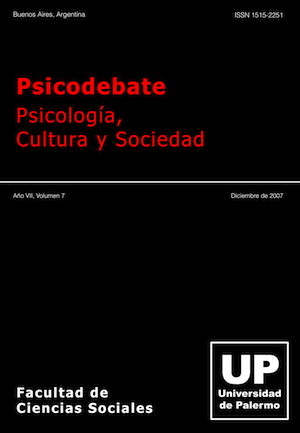Gratitud en contextos de riesgo: es posible una relación?
Resumen
El actual artículo se prepone presentar y discutir las contribuciones teóricas y empíricas en la gratitud, así como la relación existente posible entre la gratitud y el contexto del riesgo. Históricamente, la ciencia psicológica se preocupó por investigar las patologías, descuidando los aspectos saludables de los seres humanos. Sin embargo, tal paradigma ha sido cuestionado por el movimiento de la psicología positiva que propone buscar las potencialidades y las virtudes de los seres humanos. La gratitud se inserta en el rodillo de aspectos saludables y positivos del desarrollo humano. Aunque aumenta el interés por el estudio de esta emoción, la cantidad de publicaciones académicas es escasa en el tema. Existe una amplia discusión sobre el concepto de gratitud como emoción, virtud moral, recurso de las fuerzas personales, afecto moral y característica afectiva. Aunque las divergencias sean evidentes es posible identificar un consenso en las ventajas consideradas para esta experiencia, especialmente en los contextos del riesgo. Sin embargo, es necesario preguntarse como la gratitud puede emerger y ser cultivada en situaciones de adversidad total.
Descargas
Citas
Aspinwall, L. & Staudinger, U. (2003). A psychology of human strengths: Fundamental questions and future directions for a positive psychology. Washington, DC.: American Psychology Association.
Clonan, S. M., Chafouleas, S. M., McDougal, J. L., & Riley-Tillman, T. C. (2004). Positive psychology goes to school: Are we there yet? Psychology in the Schools, 41, 101–110.
Coffman, S. (1996). Parent’s struggles to rebuild family after Hurricane Andrew. Issues in Mental Health Nursing, 17, 353–367.
Compton, W. (2005). An introdution to positive psychology. Belmont: Thompson Wadsworth.
Emmons, R. A., & Crumpler, C. M. (2000). Gratitude as a human strength. Journal of Social and Clinical Psychology, 19, 56–69.
Emmons, R. A., & McCullough, M. M. (2003). Counting blessings versus burdens: An experimental investigation of gratitude and subjective well being in daily life. Journal of Personality and Social Psychology, 84, 377–389.
Emmons, R. A., & Shelton, C. M. (2002). Gratitude and the science of positive psychology. In C. R. Snyder, & S. J. Lopez (Eds.), Handbook of positive psychology (pp. 459–471). London7 Oxford University Press.
Fredrickson, B.L. (1998). What good are positive emotions? Review of General Psychology: Special Issue: New Directions in Research on Emotion, 2, 300-319.
Fredrickson, B.L. (2001). The role of positive emotions in positive psychology: The broaden-and-build theory of positive emotions. American Psychologist: Special Issue, 56, 218-226.
Frederickson, B. L. (2003). The value of positive emotions. American Scientist, 91, 330- 335.
Frederickson, B. L. (2004). Gratitude, like other positive emotions, broadens and builds. Em Emmons, R. A. & McCullough, M. E. (Orgs.), The psychology of gratitude (pp. 145- 166). New York: Oxford University PRESS.
Gallup, G. H., Jr. (1998, May). Thankfulness: America’s saving grace. Paper presented at the National Day of Prayer Breakfast, Thanks-Giving Square, Dallas, TX.
Goodenough, U. (1998). The sacred depths of nature. New York: Oxford University Press.
Gordon, A., Musher-Eizenman, D., Holub, S., & Dalrymple, J. (2004). What are children thankful for? An archival analysis of gratitude before and after the attacks of September 11. Applied Developmental Psychology 25, 541–553
Haidt, J. (2003). The moral emotions. In R. J. Davidson, K. R. Scherer & H. H. Goldsmith (Eds.), Handbook of affective sciences (pp. 852-870). Oxford, UK: Oxford University Press.
Isen, A. M. (1987). Positive affect, cognitive processes and social behavior. Advances in Experimental Social Psychology, 20, 203–253.
Keyes, C. L. M., & Haidt, J. (2003). Flourishing: Positive psychology and the life well lived. Washington DC: American Psychological Association.
Lazarus, R. S., & Lazarus, B. N. (1994). Passion and reason: Making sense of our emotions. New York7 Oxford University Press.
Lopez, S. J. & Snyder, C. R., (2003). Positive psychological assessment. Washington, DC: American Psychological Association.
Luthar, S. S. (1993). Annotation: Methodological and conceptual issues in research on childhood resilience. Journal of Child Psychology and Psychiatric, 34, 441-453.
McCullough, M. E., Emmons, R. A., & Tsang, J. (2002). The Grateful Disposition: A conceptual and Empirical Topography. Journal of Personality and Social Psychology, 82, 112-127.
McCullough, M., Kilpatrick, S., Emmons, R., & Larson, D. (2001). Is gratitude a moral affect? Psychological Bulletin, 2, 249-266.
Overwalle, F. V., Mervielde, I., & De Schuyter, J. (1995). Structural modeling of the relationships between attributional dimensions, emotions, and performance of college freshmen. Cognition & Emotion, 9, 59–85.
Paludo, S. (no prelo). Emoções Morais e Gratidão: Uma nova perspectiva sobre o desenvolvimento de jovens que vivem em situação de pobreza, na rua e na instituição de abrigo. Tese de Doutorado Não Publicada, Universidade Federal do Rio Grande do Sul.
Peterson, C. & Seligman, M. (2004). Character strengths and virtues: A classification and handbook. Washington, DC: American Psychological Association.
Rosenberg, E. L. (1998). Levels of analysis and the organization of affect. Review of General Psychology, 2, 247–270.
Russell, J. & Paris, F. (1994). Do children acdquire concepts for complex emotions abruptly? International Journal of Behavioural Developmentt, 17, 349-365.
Schimmel, S. (1997). The seven deadly sins: Jewish, Christian, and classical reflections on human nature. New York: Free Press.
Schmuck, P. & Sheldon, K. M. (2001). Life goals and well-being: Towards a positive psychology of human striving. Seattle: Hogrefe & Huber.
Seligman, M. & Csikszentmihalyi, M. (2000). Positive psychology: An introduction. American Psychologist, 55, 5-14.
Sheldon, K. M., & King, L. (2001). Why positive psychology is necessary? American Psychologist, 56, 216-217.
Smith, A. (1966). The theory of moral sentiments. New York: Kelley (Original publicado em 1759).
Snyder, C. R. & Lopez, S. J. (2002). Handbook of positive psychology. New York: Oxford University Press.
Weiner, B. & Graham, S. (1989). Understanding the motivational role of affect: Life-span research from an attributional perspective. Cognition and Emotions, 3, 401-419.
Los autores/as que publiquen en esta revista ceden los derechos de autor y de publicación a Psicodebate y aceptan el registro de su trabajo bajo una licencia de atribución de Creative Commons, que permite a terceros utilizar lo publicado siempre que de el crédito pertinente a los autores y a Psicodebate

















